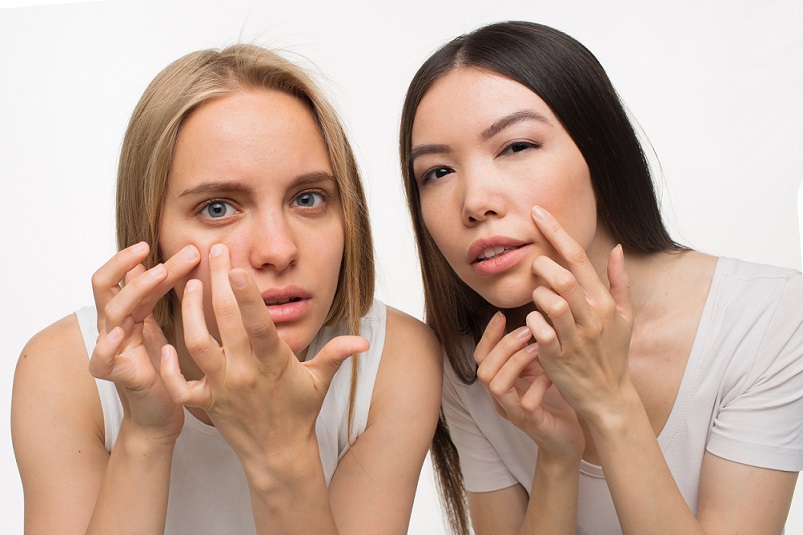
It’s pretty much assumed that nearly every teen will deal with acne at some point. But, even though teenage acne is incredibly common, it can be hard to know how to help your child when they’re going through it.
Before you panic and assume your child is doomed to spend their teen years with acne, know this: Dermatologists say there’s a lot you can do to help.
What causes teenage acne?
There are actually a lot of things going on at once that can lead to acne in teens. “The biggest culprit for teen breakouts are hormones,” Joshua Zeichner, MD, a New York City-based board-certified dermatologist, tells Yahoo Lifestyle. “During puberty, hormone levels soar, stimulating oil glands into overdrive. This ultimately blocks the pores, promotes inflammation and leads to breakouts.”
Stress plays a role too. “Students have been evaluated during testing and found to have a greater risk of acne breakouts, as compared to other times during the school year,” says Zeichner says
Nutrition can also be a factor, according to California-based dermatologist Cynthia Bailey, MD. High glycemic foods, like white bread, fries, sugary foods and dairy, in particular, “have been linked to acne,” she says. Poor hydration, sweating a lot during sports and less-than-optimal skincare can also play a role, Gary Goldenberg, MD, assistant clinical professor of dermatology at the Icahn School of Medicine at Mount Sinai in New York, tells Yahoo Lifestyle.
So what can you do about teen acne?
Some things, like stress and hormonal changes, are unavoidable. But other acne-causing factors can be helped by making the following fairly simple lifestyle tweaks.
1. Have your child try to eat low-glycemic foods
“High glycemic foods are those that raise your blood sugar fast,” explains Bailey. Sugary foods and drinks are big culprits, but foods with refined carbohydrates like chips, crackers, pasta and pizza can be problematic, she says. Focusing on foods that are low-glycemic like oats, lentils, non-starchy vegetables and lean meats can help, says Bailey.
2. Minimize dairy
If your teen’s acne is bad, it’s worth cutting back on how much dairy they have or even trying them out on a dairy-free diet, Goldenberg says. Milk contains substances that your body converts to testosterone (a hormone that causes oil production and acne), explains Bailey. Milk also stimulates your body to produce a chemical called insulin-like growth factor, which “increases your body’s own natural testosterone hormones… causing more oil production and possibly more pimples and blackheads,” she adds.
3. Be aware of hormones in their food
“I advise choosing more vegetarian options and only organic animal products, since these may have hormones that affect your hormones,” says Goldenberg.
4. Opt for non-comedogenic skincare products
Many skincare products that are non-comedogenic will actually state this on the label. Zeichner notes, “This means that they will not block your pores.”
5. Avoid heavy creams and ointments
These can block pores and lead to more acne, according to Zeichner. If your teen wears makeup, he recommends skipping liquid foundation and using mineral or powder makeup instead.
6. Look for specific cleansers
Cleansers with salicylic acid and glycolic acid can help combat acne and prevent future breakouts, Goldenberg explains. At the same time, “opt for gentle and/or pH balanced cleansers that won’t irritate skin,”says Bailey.
7. Have your teen shower after exercise
Not showering or washing up after exercise can lead to breakouts. “Damp, oily skin promotes the growth of germs that can cause acne,” explains Bailey. Washing up as soon as possible after a workout or game can help.
8. Don’t have them wash their skin too much
According to Bailey, twice a day and after exercise is ideal. And, when they wash, make sure they’re not being too vigorous. “Do not over-scrub the skin as it can lead to skin barrier disruption, inflammation and worsening of acne,” says Zeichner.
When should you see a dermatologist?
It depends. If your child is breaking out and it’s bothering them, you don’t need to wait until it gets worse to see a dermatologist, says Goldenberg. But, if you’d rather try to see how far you can get with at-home treatment first, Zeicher recommends making changes and then seeing where that gets you. If your teen’s skin is still bad after to two to four weeks, or it seems to be getting worse, it’s time to see a skin specialist.
Credit: Korin Miller, Yahoo Lifestyle
